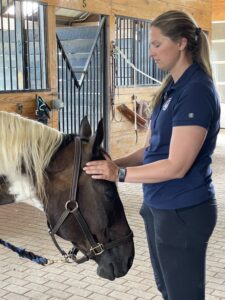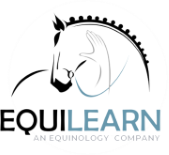
EQ1200: Equine CranioSacral Therapy – Level 1
Date:
Location:
Cost:
Duration:
*This course has been approved for 37 hours of continuing education credit in jurisdictions that recognize RACE approval.
This 5 day class will train students in the theory, concepts and practice of Craniosacral Therapy as it pertains to the equine population, while giving them the opportunity to integrate this knowledge with the Nervous System and Fascial System. This course is designed to teach participants the skills involved in evaluating and helping neuromusculoskeletal/fascial dysfunction in horses such as:
- Head Pain
- Neck Pain
- Back Pain
- Chronic/Undiagnosed Lameness
- Restriction of Motion
- Neurological Dysfunction
- Behavioral Problems
- Metabolic Dysfunction
- Overall Well-Being
Students attend class for 5 days from 8:30am – 5pm and have additional 2 hours of evening studies.
Theory
- Development of CranioSacral Therapy
- Concepts/Clinical Application of Biotensegrity
- Anatomy and Physiology of the CranioSacral System
- Anatomy and Physiology of the Fascial System
- Anatomy and Physiology of the Nervous System
- Palpation/Assessment of the CranioSacral System via the CranioSacral Rhythm
- Palpation/Assessment of the Fascial System as it Relates to the CranioSacral System
- Equine Safety
CranioSacral Therapy Techniques
- Fascial Diaphragm Releases at Transitional Areas of the Spine (Occiput-Atlas, Cervicothoracic, Thoracolumbar, Lumbosacral)
- Decompression Techniques (Occipitoatlantal Junction, Lumbosacral Junction, Sacrococcygeal Junction)
- Dural Tube Release
- Iliopsoas Release
- Intertransverse Joints Release
- Sacrosciatic Ligament Release
- Scapular Mobilization
- Cranial Vault Release (Intraosseous and Interosseous)
- Frontal
- Parietal and Interparietal
- Squamous Temporal
- Petrous Temporal
- Sphenoid
- Intracranial Membrane Techniques
This course is open to anyone with a working knowledge of veterinary vocabulary, anatomy and horse handling skills. Students new to the field are welcome to participate but must first register for the EQ50: Equine Anatomy Precourse Distance Study. Participants of the Equinology® Equine Body Worker Certification course will be well prepared for this course, even if the externship has not yet been completed.
Course Materials (included in tuition):
Course Handouts
Externship (included in tuition):
Externship Grading (Case Studies and Visual Presentation)
Dr. Sandra Howlett, DC. CST-D, ECST, Certified Veterinary Chiropractic, EFLC

Dr. Howlett came into this world with a love of people, animals, and health. She has three passions in life: people helping people, people helping animals, and animals helping people.
Dr. Howlett graduated from Canadian Memorial Chiropractic College in 1987. Her early days in practice were successful, yet she quickly began searching for more education and more diversity. She discovered Dr. John Upledger, DO, OMM and fell into the osteopathic approach, especially cranial osteopathy, in facilitating self-correction. Over the years with Upledger, she became diplomate certified and was an instructor and examiner for Upledger’s students.
Dr. Howlett pursued further training offered under the International Alliance of Healthcare Educators, including neural manipulation, visceral manipulation, lymphatic drainage, and manual brain/glial matrix work. She has also completed the animal chiropractic training, which is a post-doctorate program offered only to veterinarians and chiropractors.
With a further quest for understanding animals, especially horses, Dr. Howlett completed two different certifications in Equine Facilitated Learning/Therapy. When she discovered that addressing “head cases” (including what is often referred to as behavioral) was lacking in the therapeutic approach to helping animals, she developed a curriculum in CranioSacral Therapy. This curriculum is focused on integrating the craniosacral system, the fascial system and the nervous system, thereby facilitating self-healing. This program was originally offered through Integrative Intentions, then Upledger, and now she is pleased to be offering this curriculum through Equinology and its Independent Licensed Companies, including the EquiLearn Institute. She is excited to delve deeper into the science behind the techniques being offered and the overall approach to animal health care.
A $350 deposit is required to hold your spot in a course – the remainder of the tuition is due at least 45 days prior to the course start date. The $350 deposit is nonrefundable and nontransferable, and is credited to the total tuition for the course. Confirmation letters, course outlines, required pre-study (if applicable), directions and lodging options will be sent when the $350 deposit has been received.
*This course has been approved for 37 hours of continuing education credit in jurisdictions that recognize RACE approval.
This 5 day class will train students in the theory, concepts and practice of Craniosacral Therapy as it pertains to the equine population, while giving them the opportunity to integrate this knowledge with the Nervous System and Fascial System. This course is designed to teach participants the skills involved in evaluating and helping neuromusculoskeletal/fascial dysfunction in horses such as:
- Head Pain
- Neck Pain
- Back Pain
- Chronic/Undiagnosed Lameness
- Restriction of Motion
- Neurological Dysfunction
- Behavioral Problems
- Metabolic Dysfunction
- Overall Well-Being
Students attend class for 5 days from 8:30am – 5pm and have additional 2 hours of evening studies.
Theory
- Development of CranioSacral Therapy
- Concepts/Clinical Application of Biotensegrity
- Anatomy and Physiology of the CranioSacral System
- Anatomy and Physiology of the Fascial System
- Anatomy and Physiology of the Nervous System
- Palpation/Assessment of the CranioSacral System via the CranioSacral Rhythm
- Palpation/Assessment of the Fascial System as it Relates to the CranioSacral System
- Equine Safety
CranioSacral Therapy Techniques
- Fascial Diaphragm Releases at Transitional Areas of the Spine (Occiput-Atlas, Cervicothoracic, Thoracolumbar, Lumbosacral)
- Decompression Techniques (Occipitoatlantal Junction, Lumbosacral Junction, Sacrococcygeal Junction)
- Dural Tube Release
- Iliopsoas Release
- Intertransverse Joints Release
- Sacrosciatic Ligament Release
- Scapular Mobilization
- Cranial Vault Release (Intraosseous and Interosseous)
- Frontal
- Parietal and Interparietal
- Squamous Temporal
- Petrous Temporal
- Sphenoid
- Intracranial Membrane Techniques
This course is open to anyone with a working knowledge of veterinary vocabulary, anatomy and horse handling skills. Students new to the field are welcome to participate but must first register for the EQ50: Equine Anatomy Precourse Distance Study. Participants of the Equinology® Equine Body Worker Certification course will be well prepared for this course, even if the externship has not yet been completed.
Course Materials (included in tuition):
Course Handouts
Externship (included in tuition):
Externship Grading (Case Studies and Visual Presentation)
Dr. Sandra Howlett, DC. CST-D, ECST, Certified Veterinary Chiropractic, EFLC

Dr. Howlett came into this world with a love of people, animals, and health. She has three passions in life: people helping people, people helping animals, and animals helping people.
Dr. Howlett graduated from Canadian Memorial Chiropractic College in 1987. Her early days in practice were successful, yet she quickly began searching for more education and more diversity. She discovered Dr. John Upledger, DO, OMM and fell into the osteopathic approach, especially cranial osteopathy, in facilitating self-correction. Over the years with Upledger, she became diplomate certified and was an instructor and examiner for Upledger’s students.
Dr. Howlett pursued further training offered under the International Alliance of Healthcare Educators, including neural manipulation, visceral manipulation, lymphatic drainage, and manual brain/glial matrix work. She has also completed the animal chiropractic training, which is a post-doctorate program offered only to veterinarians and chiropractors.
With a further quest for understanding animals, especially horses, Dr. Howlett completed two different certifications in Equine Facilitated Learning/Therapy. When she discovered that addressing “head cases” (including what is often referred to as behavioral) was lacking in the therapeutic approach to helping animals, she developed a curriculum in CranioSacral Therapy. This curriculum is focused on integrating the craniosacral system, the fascial system and the nervous system, thereby facilitating self-healing. This program was originally offered through Integrative Intentions, then Upledger, and now she is pleased to be offering this curriculum through Equinology and its Independent Licensed Companies, including the EquiLearn Institute. She is excited to delve deeper into the science behind the techniques being offered and the overall approach to animal health care.
A $350 deposit is required to hold your spot in a course – the remainder of the tuition is due at least 45 days prior to the course start date. The $350 deposit is nonrefundable and nontransferable, and is credited to the total tuition for the course. Confirmation letters, course outlines, required pre-study (if applicable), directions and lodging options will be sent when the $350 deposit has been received.
